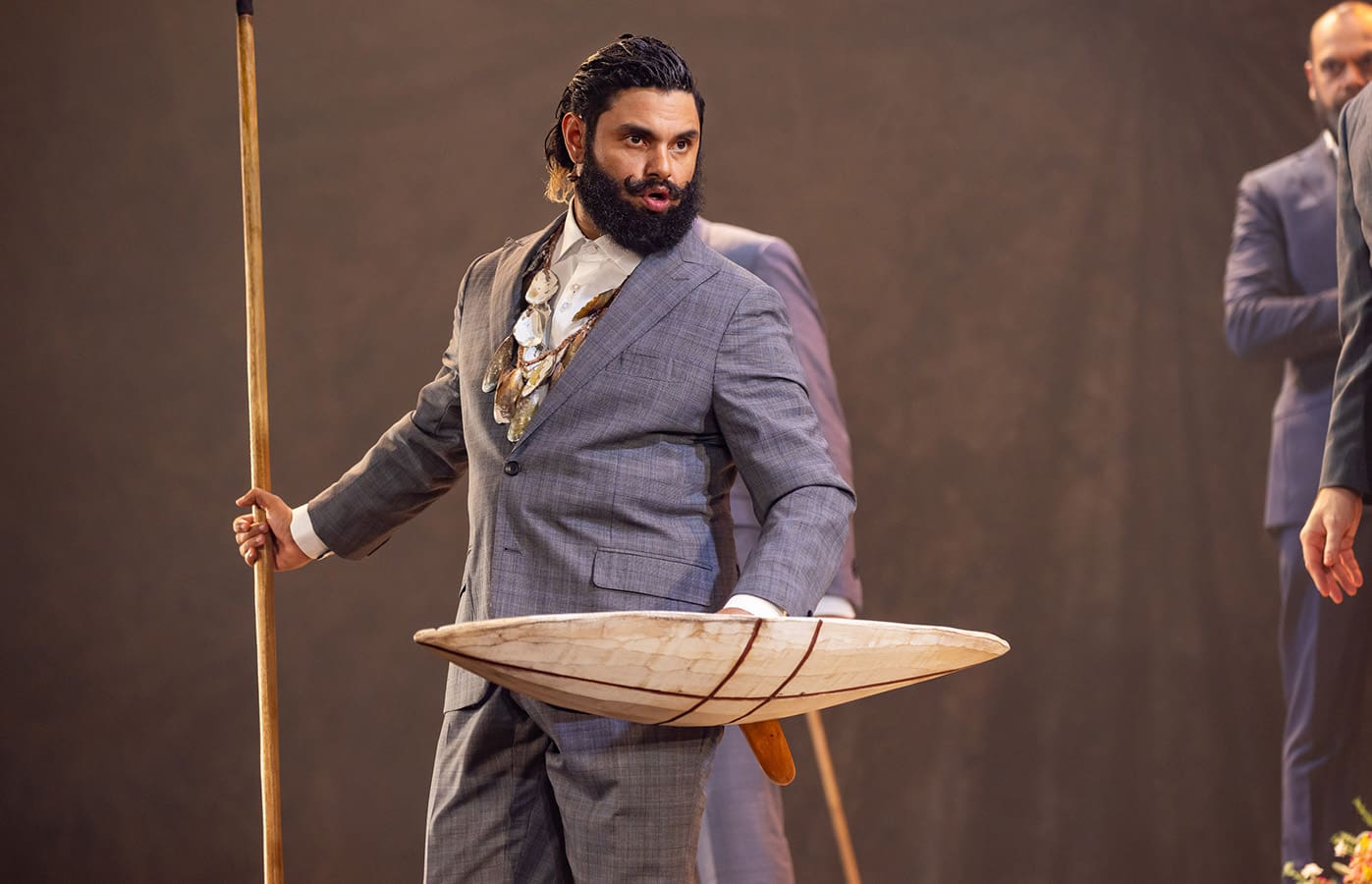As the First Fleet sailed into Warrane (Sydney Cove), how did the local First Nations clans decide how to respond? Should you welcome these visitors onto your Country, or should you repel them with force? What is their motivation for coming here? Are they dangerous? Do they need help? What could you teach them about your laws and customs, and is there any possibility that you could learn something from them? After all, visitors leave… right?
Conceived by Muruwari playwright Jane Harrison and brought to life under the direction of Nunukul and Ngugi man Wesley Enoch — arguably one of the eminent First Nations creatives working today — The Visitors deftly explores themes which are as prescient now as they were in 1788. Set on the eve of the British colonists’ arrival, the play deals unequivocally with how we collectively perceive Invasion Day. It reminds us of the unfinished business of Australia’s original sin, and the eternal challenge of having to share sovereign land with non-Indigenous people.
Beyond the most apparent themes, other issues lie in the audience’s periphery — issues of jingoism and negotiating multiculturalism. The Visitors interrogates how we view refugees and asylum seekers, offering an analogous representation of Australia’s treatment of migrants. However, most viscerally, the play poses questions of cultural vitality and of how we — as First Nations people — struggle to maintain our connection to sky, land and water. Enoch’s staging and direction weaves a story that forces the audience to contemplate the realities of colonisation in Australia long after they leave the theatre.
The opening dialogue — spoken entirely in the language of the Bidjigal people — introduces the audience to Gordon (Arrernte and Arabana man Aaron Pedersen) of Sydney Cove, Wallace (Wiradjuri and Gumbaynggirr woman Dalara Williams) of the River, Joseph (Noongar man Kyle Morrison) of the Headlands, Gary (Biripi and Worimi man Guy Simon) of the Northern Parramatta River, Albert (Wiradjuri and Gamillaraay man Beau Dean Riley Smith) of the South Shore, Jacky (Pitjantjatjara and Yankunytjatjara woman Elaine Crombie) of Manly Cove’s North Shore, and Lawrence (Tiwi and Arrernte man Joseph Wunujaka Althouse) of Botany Bay. Though arguments ensue and a consensus is highly elusive, the Elders contemplate their response within customary frameworks of respect and reciprocity.
On a set imagined by designer Elizabeth Gadsby, evocative of the sandstone cliffs which protect the Sydney peninsula, Elders from around the area meet to discuss these “visitors”’ as they prepare to disembark from their eleven mari nawi (big canoes). Amidst driftwood and shell middens, the Elders wear corporate suits which reinforce their status to the largely non-Indigenous audience. The anachronism of Gadsby’s costuming could be seen either as a reclamation of authority or an artistic foreshadowing of assimilation.
The Visitors’ clever dialogue allows for considered and conscientious character development throughout the play as arguments are presented, stories told, and perceptions challenged. The unique cultural obligations held by each Elder adds complexity to the story. While many depictions of colonised communities can be imperious and patronising, The Visitors is a story of sovereignty — and the nuanced responsibility of maintaining that sovereignty. Though contemporary Australia collectively recalls the act of British colonisation on this continent as inevitable and uncontested, The Visitors enacts some vital truth-telling — that Aboriginal diplomacy (and eventually, resistance) characterised the early stages of invasion.
As Wiradjuri author Stan Grant articulated in an interview with Honi earlier this year, “there were people standing on the shore as Cook weighed anchor. Smoke from campfires trailed the white men who trekked over the great mountains west of Sydney; black people watched these people who appeared like ghosts.”
The standout performance comes from Aaron Pedersen as Gordon (standing in for Wiradjuri and Ngunnawal performer Luke Carroll on this particular night). Pedersen’s commanding presence and controlled rage shines in a raw and powerful monologue recounting Gordon’s experience with early colonial violence, eighteen years earlier in 1770. Pedersen’s control of outrage, anguish, and solemnity is masterful as he proclaims to the disembarking colonists, “this is my father’s country. This is my country.”
At its heart, The Visitors tells the story of a civilisation built on generosity and community obligation, a people who cannot apprehend the concepts of colonisation and dispossession. The Visitors asks us: how do you uphold and honour your own cultural values when faced with a dominant force that doesn’t understand or respect them?
The Visitors is a powerfully contemplative story that contradicts our collective memory of colonisation. It humanises history and centres First Nations sovereignty at the heart of so-called Australia’s inception. In the wake of a failed referendum for a Voice to Parliament, The Visitors reminds us of the other prescient elements of the Uluru Statement from the Heart — the doctrine of terra nullius meant that a treaty was never negotiated on this continent, and the erasure of First Nations cultures and histories necessitates a radical approach to truth-telling. The Visitors serves as a reminder of the struggle ahead for First Nations people as we secure our sovereignty, and provides emotional and cultural catharsis for a community so deeply and perpetually affected by the legacy of colonisation.
The Visitors will play at Riverside Theatres Parramatta until October 21, Illawarra Performing Arts Centre from October 25-28, Geelong Arts Centre from November 1-4, and Canberra Theatre Centre from November 8-11.





